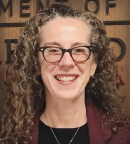Research shows that the average cost of medical care and drugs can top $42,000 in the first year following a cancer diagnosis, with the cost of some treatments, including chimeric antigen receptor T-cell therapies, exceeding $1 million. For many cancer survivors, these costs can have a lingering impact on their financial well-being.
A study led by researchers at the American Cancer Society found that with the high out-of-pocket costs for cancer care, nearly 60% of working-age cancer survivors report experiencing at least one type of financial hardship, including being unable to afford medical bills, cost-related distress and worry, or delaying or forgoing needed care because of cost. Increasing the availability of comprehensive and affordable health insurance; ensuring paid, job-protected leave; and connecting cancer survivors with financial resources may help mitigate lasting financial harms, according to the researchers. The study by K. Robin Yabroff, PhD, and colleagues was published in CA: A Cancer Journal for Clinicians.

K. Robin Yabroff, PhD
Study Methodology
The researchers used a composite patient case to illustrate the adverse consequences of a cancer diagnosis and treatment on employment, health insurance coverage, household income, and other aspects of financial hardship. They then summarized existing research and provided nationally representative estimates of multiple aspects of financial hardship and health insurance coverage. They also specifically considered employee benefits, such as paid sick leave among working-age adults with a history of cancer compared with estimates among working-age adults aged 18 to 64 years without a history of cancer from 2019 to 2021, the most recently available years of the National Health Interview Survey.
Results
The researchers found that adults aged 18 to 64 years with a cancer history in the United States were more likely to report that they experienced any medical financial hardship in the past 12 months compared with their counterparts with no cancer history (57.3% vs 53.5%, P < .05), including problems paying medical bills (21.6% vs 12.7%, P < .05) or delayed or forgone care because of cost (12.7% vs 9.2%, P < .05). Stress and worry about medical bills were similar among adults with and without a cancer history (52.5% vs 50.2%, respectively). Although the prevalence of financial hardship was highest among adults with a cancer history who live in households at < 200% of the federal poverty level (67.5%), it is also common among those living in higher-income households (66.6% and 43.8% at 200%–399% and > 400% of the federal poverty level, respectively).
Although the researchers found that the prevalence of medical financial hardship is highest among working-age adults without health insurance (83.7%), their results also showed that survivors experience financial hardship even with public or private health insurance (58.3% and 52.9%, respectively). In addition, adults with a cancer history were more likely to report food insecurity in the past 30 days compared with those without a cancer history (20.0% vs 14.3%, P < .05), including worry about food running out, food not lasting, or the inability to afford balanced meals.
Mitigating Financial Hardship
The researchers suggest that increasing the availability of comprehensive and affordable health insurance coverage; ensuring sufficient, paid, job-protected leave to allow patients to maintain employment and household income; and connecting patients and their families with this information as part of routine cancer care can help mitigate the lasting financial harms of a cancer diagnosis.
“Rigorous research can identify best practices and, when combined with efforts to increase the affordability of cancer treatment, our proposed approaches can better enable patients and their families in the United States to benefit from the remarkable advances in cancer treatments without suffering potentially avoidable financial hardship,” concluded the study authors.
Dr. Yabroff, of the Surveillance and Health Equity Science Department, American Cancer Society, is the corresponding author of the CA: A Cancer Journal for Clinicians report.
Disclosure: For full disclosures of the study authors, visit acsjournals.onlinelibrary.wiley.com.

